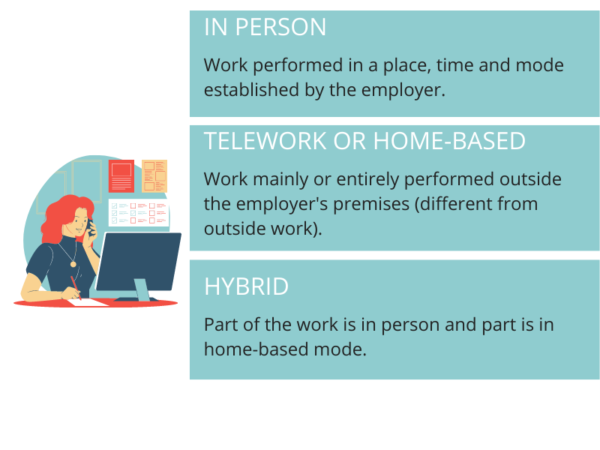Social Security: INSS contribution table in 2021
07/01/2021The public calamity state is extended in Rio de Janeiro
08/01/2021EXPERT OPINION
Home-based, in-person or hybrid system: transition between models demands caution
Companies must seek guidance in the current legislation to avoid exposure to labor risks
By Luciana Lupinucci
With the crisis triggered by Covid-19, many businesses immediately adopted the home-based work. Months later, this format begins to give signs of weakening. In fact, according to Orbit Data Science, at the beginning, 70% of people said they were satisfied with working at home, but in October, the approval dropped to 43%.
Finding a balance between performance, interaction, and life quality, companies are beginning to evaluate a more flexible format, with the hybrid model growing in this transition phase.
While the pandemic is still a reality and the vaccine is not immediately available, each company seeks the most adequate solution to its own characteristics and culture. Understand the operating models:

What the legislation provides for
According to the Law 13,467/2017 (Labor Reform), telework is considered "the provision of services predominantly in other premises than the employer's, with the use of information and communication technologies, by its nature, does not constitute as outside work”. This model has been named home office (home-based work).
Even if the employee needs to attend the employer's premises for specific activities, the telework is not mischaracterized.
Expressly and clearly, there is no regulation for a hybrid model. From the concept of in-person and telework system, the recommendations for this third form are made.
The legislation deals superficially with teleworking, without predicting issues that currently raise doubts, such as structure, costs, resources, hours, health and safety at work in full or partial remote performance.
Thus, the rules will need to be improved to better handle the new situations, ensuring more legal certainty.
See how the issue is addressed by legislation:
|
CLT (1943) |
LABOR REFORM (2017) |
PM 927 (2020) |
|
The Consolidation of Labor Laws did not provide for remote work, which is comprehensible, since its publication dates from 1943. |
The Law 13467/2017 (Labor Reform) devoted a chapter to telework. |
Due to the pandemic, there was an effort to make telework practice more flexible and to bring additional issues, but the Provisional Measure was only effective from March to July/2020. |
Highlights
Based on Law 13,467/2017, the companies should have attention to the following:
Rules must be established in the individual employment relationship agreement
The provision of services in the teleworking model must be expressed in the individual agreement, which must also detail the activities performed by the employee.
Change between in-person and teleworking system
Upon agreement between the parties, the change may be made between in-person and teleworking modality, and must be registered as an amendment to the employment agreement.
The change of the teleworking to in-person system
due to employer’s determination
should be made in a minimum transition period of 15 days, registered as an agreement amendment.Resources for the provision of services
The obligations are not established, but provisions on liability for the acquisition, maintenance, or supply of equipment and infrastructure required for remote work, as well as the reimbursement of expenses incurred by the employee, must be included in the agreement.
| Under the in-person system, the company naturally provides equipment and infrastructure. In the telework or hybrid system, the employer is not required to provide equipment or support costs for these purposes. |
Health and safety
The legislation also provides that the employer is responsible for expressly and ostensibly instructing the employees, regarding the prevention of illnesses and accidents at work. The worker must sign a commitment term to follow such instructions.
| It is noteworthy that the need to adapt the corporate environments for hybrid or in-person resumption, in addition to measures such as the supply of masks, distance between workstations and other actions that have been established by health agencies and the federal, state or municipal public power. |
The importance of the collective agreements
The collective agreement and the collective bargaining agreement prevail over the law in a number of issues, inclusive when these mechanisms provide for the teleworking practices.
Time clock registration
The time clock registration is mandatory for companies with more than 20 workers, according to the current legislation.
Pursuant to Ordinance 373/2011, "employers may adopt alternative systems of control of working hours, provided they are authorized by Collective Bargaining Agreement or Convention”.
However, there is no obligation for the clocking in the model of telecommuting or hybrid systems. Nevertheless, it is recommended that the parties agree on the control of the journey.
This is a controversial item, because the lack of control may lead to overworking hours. In order to protect the company from legal liabilities, the service agreement must provide for working hours, daily working hours, and remuneration.
Specialized support to safely apply new models
As new themes and approaches have been emerged in the labor area, it is important to count on specialized support to avoid failures that expose the company to risks.
DPC has a team closely watching changes in legislation and market trends, able to assist companies in labor practices and transition processes between operating systems, ensuring confidence in defining working models in these recent times.

Author: Luciana Lupinucci, partner and manager of the Labor and Social Security Department at Domingues e Pinho Contadores.
How DPC may help your company?
Domingues e Pinho Contadores has specialized team ready to assist your company.
Contact us by the e-mail dpc@dpc.com.br
See more
Sign up for our Newsletter:
Are you interested?
Please contact us, so we can understand your demand and offer the best solution for you and your company.
Rio de Janeiro
Av. Rio Branco 311, 4º e 10º andar - Centro
CEP 20040-903 | Tel: +55 (21) 3231-3700
São Paulo
Rua do Paraíso 45, 4º andar - Paraíso
CEP 04103-000 | Tel: +55 (11) 3330-3330
Macaé
Rua Teixeira de Gouveia 989, sala 302 - Centro
CEP 27910-110 | Tel: +55 (22) 2773-3318







